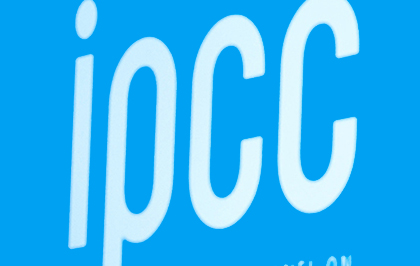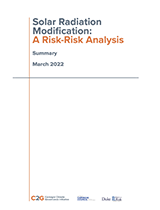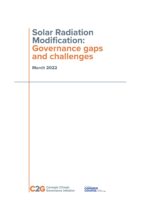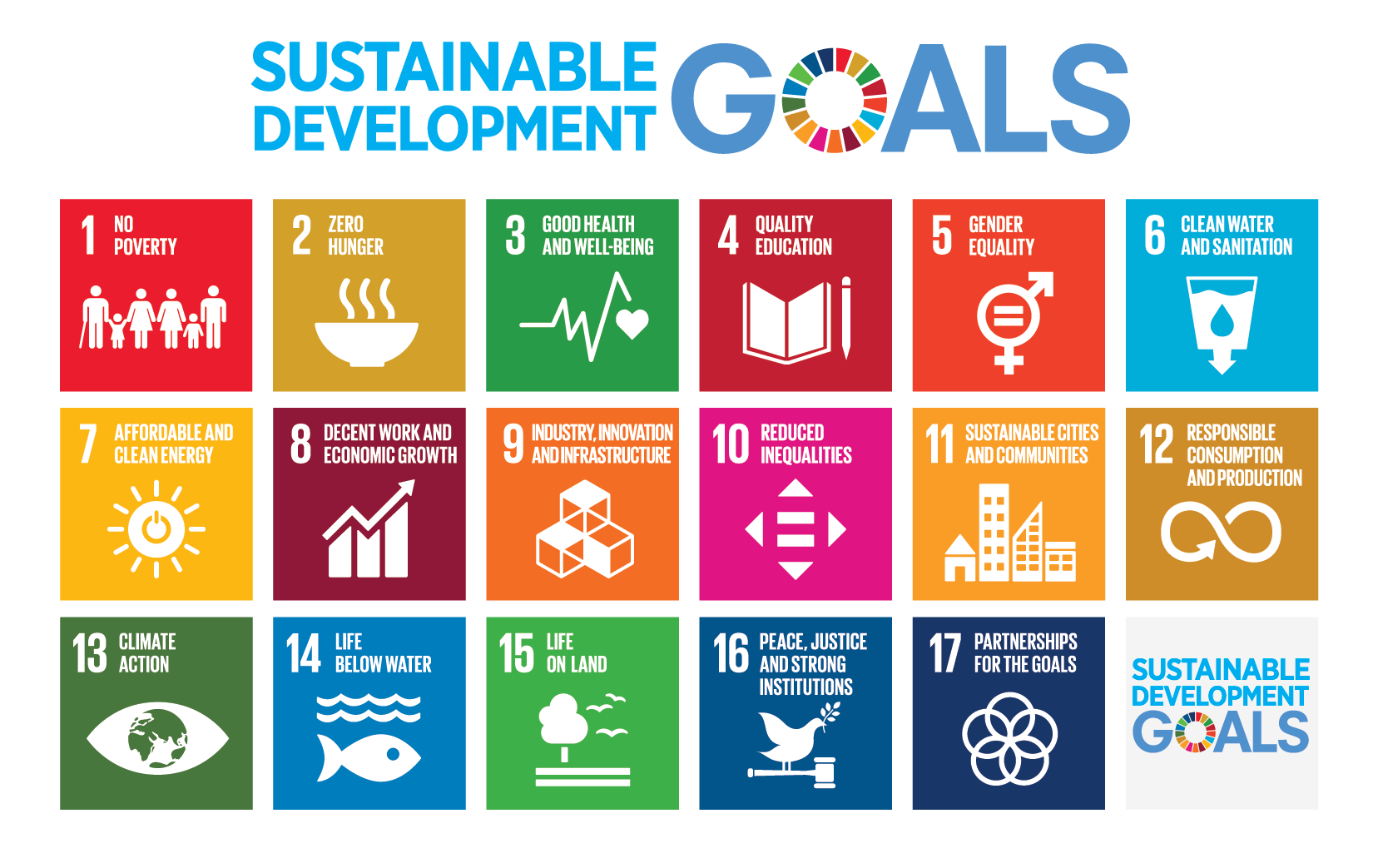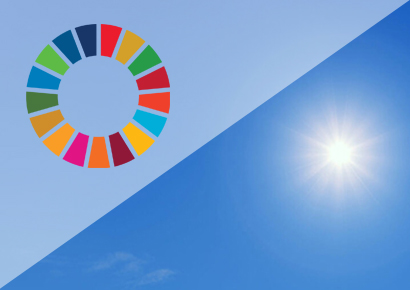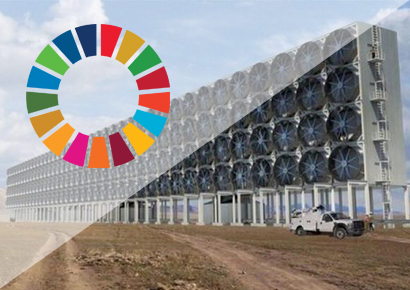The Science and Governance of Climate-Altering Techniques: Implications for Sustainable Development
23 February 2023
14:00-15:30 IST (8:30-10:00 UTC) in New Delhi
The world is not on track to meet the Paris Agreement temperature goals. According to the latest reports released by the Intergovernmental Panel on Climate Change (IPCC), even with the deepest emissions reductions and removals scenarios assessed by the IPCC, it is now more likely than not that warming will temporarily exceed 1.5°C (overshoot). Human-induced climate change has already caused widespread adverse impacts and poses additional severe risks if global warming exceeds 1.5°C, threatening the achievement of the Sustainable Development Goals (SDGs). In this context, some additional approaches have been proposed by scientists to limit temperature rise.
CDR refers to human activities removing carbon dioxide from the atmosphere and durably storing it in geological, terrestrial, or ocean reservoirs, or in products. The IPCC reaffirms that large-scale CDR will be needed, in addition to transformative emission reductions, to deliver net-zero emissions by mid-century and net negative thereafter, to achieve the Paris Agreement temperature goals. However, many CDR techniques are untested at scale and many governance challenges remain to be addressed.
Considering the increasing likelihood of overshoot, another set of techniques known as SRM, seek to deliberately change the albedo of the Earth system, reflecting solar radiation back into space to cool the planet. According to IPCC assessments, while some SRM techniques may be theoretically effective in reducing some climate hazards, they face large uncertainties and knowledge gaps, and give rise to substantial risks including the lack of governance around SRM representing a risk on its own. However, overshooting the Paris Agreement temperature goals also entails many risks for both humanity and the ecosystems we depend on for survival. To make well-informed decisions for managing climate risk, will require the benefits and risks of these approaches to be assessed and compared to scenarios without their use, in a quickly warming world. The Sustainable Development Goals (SDGs) can be used as a basis for evaluating the risks and benefits of CDR and SRM in the context of sustainable development.
Agenda
| Opening remarks | Mr. Nitin Desai, Chairman, TERI and Former Under Secretary General for Economic and Social Affairs, UN |
| Keynote
Managing climate overshoot risk: role of CDR and SRM |
Ms. Thelma Krug, National Institute for Space Research, Brazil and Vice-Chair, Intergovernmental Panel on Climate Change |
| Panel discussion | Moderator: Mr. Janos Pasztor, Executive Director, Carnegie Climate Governance Initiative
Speakers
|
| Q &A with the audience | Moderator: Mr. Janos Pasztor, Executive Director, Carnegie Climate Governance Initiative |
Speakers
Manish Kumar Shrivastava, Senior Fellow, The Energy and Resources Institute
 Dr. Manish Kumar Shrivastava, a Senior Fellow at TERI, is an inter-disciplinary researcher by training with over 16 years of research experience. His research interests include theories and practices of justice with a particular reference to the interaction of energy, technology, finance, and environmental policy in multi-level governance and fragmented society contexts. His current research focuses on challenges and opportunities faced in pursuit of just energy transition in India from the perspective of finance and gender justice, role of sub-national and non-state actors in scaling up climate action in developing countries, and relevance of frugality in technological choices and governance for sustainability. He has led many research projects like preparedness of the Indian Oil & Gas sector to face challenges posed by climate change, implementing Nationally Appropriate Mitigation Actions, key issues in climate change negotiations, and many international projects such as SNAPFI, Climate Transparency Report, INDGREEN, ADAM, CLIPORE, Global Climate Network, etc. He assisted government of Nepal in accessing technical assistance from the CTCN, UNFCCC’s technology mechanism. Earlier, he has taught climate policy and economics at TERI School of Advanced Studies, New Delhi. He was also associated with the Indian Institute of Foreign Trade, and Council for Social Development. He serves on the editorial board of the journal Climate Action. He holds Ph.D. and M.Phil. Degrees in Science Policy and a Master’s Degree in Economics from Jawaharlal Nehru University, New Delhi.
Dr. Manish Kumar Shrivastava, a Senior Fellow at TERI, is an inter-disciplinary researcher by training with over 16 years of research experience. His research interests include theories and practices of justice with a particular reference to the interaction of energy, technology, finance, and environmental policy in multi-level governance and fragmented society contexts. His current research focuses on challenges and opportunities faced in pursuit of just energy transition in India from the perspective of finance and gender justice, role of sub-national and non-state actors in scaling up climate action in developing countries, and relevance of frugality in technological choices and governance for sustainability. He has led many research projects like preparedness of the Indian Oil & Gas sector to face challenges posed by climate change, implementing Nationally Appropriate Mitigation Actions, key issues in climate change negotiations, and many international projects such as SNAPFI, Climate Transparency Report, INDGREEN, ADAM, CLIPORE, Global Climate Network, etc. He assisted government of Nepal in accessing technical assistance from the CTCN, UNFCCC’s technology mechanism. Earlier, he has taught climate policy and economics at TERI School of Advanced Studies, New Delhi. He was also associated with the Indian Institute of Foreign Trade, and Council for Social Development. He serves on the editorial board of the journal Climate Action. He holds Ph.D. and M.Phil. Degrees in Science Policy and a Master’s Degree in Economics from Jawaharlal Nehru University, New Delhi. Ajay K. Sood, Principal Scientific Adviser, Government of India

Prof. Ajay Kumar Sood is the Principal Scientific Advisor to the Government of India (PSA to GoI) from April 2022. He is also the Chairperson of the Prime Minister’s Science, Technology & Innovation Advisory Council (PM-STIAC). Prof. Sood is also a National Science Chair at the Indian Institute of Science (IISc) Bangalore. He was a member of the Prime Minister’s Science, Technology, and Innovation Advisory Council (PM-STIAC) from 2018 to March 2022 and from 2009 to 2014, he had also served as a Member of the Scientific Advisory Council (SAC) to the Prime Minister of India.
Prof. Sood has a Doctorate in Physics from IISc Bangalore. His research interests include the Physics of Quantum materials, soft and active matter. He has published more than 450 papers in peer-reviewed journals and holds several patents.
His work has been recognised by many awards, including the Padma Shri, the fourth highest civilian award in India. He was President of the Indian National Science Academy (2017-19), President of the Indian Academy of Sciences (2010-12), and Secretary-General, The World Academy of Sciences (TWAS), Trieste, Italy (2013-2018). He was elected to the Fellowship of the Royal Society, UK (FRS) in 2015.
He has also received the Shanti Swarup Bhatnagar Prize, the G. D. Birla Award for Scientific Research, the TWAS Prize in Physics, the Millennium Gold Medal of the Indian Science Congress Association, the Sir C. V. Raman Award of the UGC, the Homi Bhabha Medal of the Indian National Science Academy, G. M. Modi Award for Science and Technology, 25th SIES Sri. Chandrasekarendra Saraswathi National Eminence Award in the category of Science & Technology and Asutosh Mookerjee Memorial Life Time Award by Indian Science Congress, among others. He has been conferred Doctor of Philosophy (Honoris Causa) by many universities. He serves as Associate Editor in a reputed International Journal, ACS Nano.
Gabriela Ramos, Assistant Director-General for Social and Human Sciences, United Nations Educational, Scientific and Cultural Organization

Gabriela Ramos is the Assistant Director-General for the Social and Human Sciences of UNESCO, where she oversees the institution’s contributions to building inclusive societies. Her mandate includes tackling economic inequalities of income and opportunity, and promoting social inclusion and gender equality. She also oversees the youth support agenda, promotion of values through sport, fight against racism and discrimination, and ethics of science, including of neurotechnology and the internet of things. She has overseen the development and adoption of the first global instrument to promote the ethics of artificial intelligence, adopted by acclamation in 2021 by UNESCO’s General Conference. She also launched the Global Forum against Racism, to catalyse the political support that member countries have given to this cause. On gender, she has advanced several initiatives, particularly to combat gender stereotypes and biases, including in new technologies.
Previously, Gabriela Ramos worked as Cabinet Director and Sherpa for G20/G7APEC at the OECD, contributing to increasing the OECD’s global impact and leading key initiatives such as “Inclusive Growth”, “New Approaches to Economic Challenges”, “Climate Change and Growth”, the gender strategy and work on well-being and children. At the G20, she contributed to the international reform of tax systems; the adoption of the gender quota (to reduce the labour gap) and the establishment of the W20; and the adoption of the principles of artificial intelligence, among others. She also oversaw Global Relations and the OECD’s membership enlargement process.
Jo Tyndall, Director, Environment Directorate, The Organisation for Economic Co-operation and Development

Jo Tyndall is Director, Environment Directorate at the OECD where she oversees the implementation of the Directorate’s programme of work, covering a broad range of environmental issues, including: green growth; climate change; biodiversity; quality of ecosystems; eco-innovation; circular economy; and, resource productivity.
She was, most recently, New Zealand High Commissioner (Ambassador) to Singapore from February 2019 to September 2022. Prior to that, Jo served as New Zealand’s Climate Change Ambassador, commencing this role in June 2010. From 2016 to December 2018, she also co-chaired the United Nations Framework Convention on Climate Change’s (UNFCCC) Ad Hoc Working Group on the Paris Agreement (APA). As Climate Change Ambassador, she was head of delegation to the United Nations climate negotiations with the Ministry of Foreign Affairs and Trade.
Prior to her role as Climate Change Ambassador, Ms Tyndall was Director of the Broadcasting Unit in the Ministry for Culture and Heritage. From 1999 to 2006, she was Chief Executive of the public broadcasting funding body, NZ On Air. She has also served as Chief Executive of two screen industry organisations – the Screen Production and Development Association (SPADA) and Project Blue Sky (1994 to 1999).
Ms Tyndall began her career as a multilateral trade policy specialist with the then Department of Trade and Industry and subsequently the Ministry of Foreign Affairs and Trade.
Nitin Desai, Chairman, The Energy and Resources Institute and Former Under Secretary General for Economic and Social Affairs, UN
Mr Nitin Desai is a distinguished economist and a well-known voice in public policy for a nationally and internationally, especially in the sustainable development sector. He was in the Planning Commission (1973-88) and later served as the Chief Economic Adviser and Secretary, Department of Economic Affairs, in the Ministry of Finance (1988-90). He also served as Senior Economic Adviser for the World Commission on Environment and Development (the Brundtland Commission) where he introduced the concept of sustainable development. He was the Under Secretary General for Economic and Social Affairs in the UN, where his major contributions included the organization of a series of global summits, notably the Rio Earth Summit (1992), the Copenhagen Social Development Summit (1995), the Monterrey Finance and Development Summit (2002) and the Johannesburg Sustainable Development Summit (2002). He oversaw the creation of the Commission on Sustainable Development in the UN, and was the first Under Secretary General for Policy Coordination and Sustainable Development.
Janos Pasztor, Executive Director, Carnegie Climate Governance Initiative
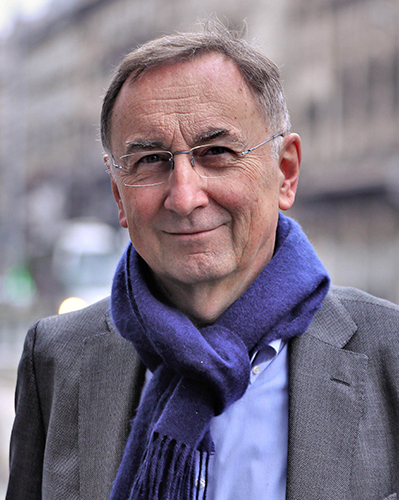
Earlier, he was Acting Executive Director for Conservation (2014), and Policy and Science Director (2012-2014), at WWF International. He directed the UNSG’s Climate Change Support Team (2008-2010) and later was Executive Secretary of the UNSG’s High-level Panel on Global Sustainability (2010-2012). In 2007 he directed the Geneva-based UN Environment Management Group (EMG). During 1993-2006 he worked and over time held many responsibilities at the Climate Change Secretariat (UNFCCC), initially in Geneva and later in Bonn.
His other assignments included: the Secretariat of the UN Conference on Environment and Development (Earth Summit ’92); Stockholm Environment Institute; United Nations Environment Programme (UNEP); Secretariat of the World Commission on Environment and Development (Brundtland Commission); the Beijer Institute; and the World Council of Churches. He has BSc and MSc degrees from the Massachusetts Institute of Technology (MIT).
Thelma Krug, Former Researcher, National Institute for Space Research, Brazil and Vice-Chair, Intergovernmental Panel on Climate Change
She was elected Vice-Chair of the Intergovernmental Panel on Climate Change (IPCC) for the Sixth Cycle of Panel (October 2015 – October 2022), after having been co-chair of the IPCC Task Force on National Greenhouse Gas Inventories from 2002 until 2015. She holds a PhD on Spatial Statistics from the University of Sheffield, UK. She has been Deputy National Secretary at the Secretary on Policies and Programs of Science and Technology at MCTIC; National Secretary at the Secretary on Climate Change and Environmental Quality from the Ministry of the Environment (MMA) and Director of the Department on Policies to Combat Deforestation under the Secretary of Climate Change and Forests at MMA.
For more than 15 years she has represented Brazil in the negotiations at the United Nations Framework Convention on Climate Change (UNFCCC), with particular focus on issues related to land use, land-use change and forestry (LULUCF); research and systematic observations; and reporting guidelines. Her main areas of interest are climate change and the role of deforestation, forest degradation and land-use change; REDD+; and national greenhouse gas inventories.
Amena V. Yauvoli, Ambassador Extraordinary & Plenipotentiary of Fiji to the Republic of Indonesia
 Amena V. Yauvoli attained a distinguished career both as a Fijian diplomat and civil servant with commencement of work into the civil service in 1988. Ambassador Yauvoli has more than 30 years of working experience at the international, regional and national levels, having worked at the Pacific level in four Pacific regional organisations (SPREP, SPC, PIDF, MSG Secretariat) and at the international level with a stint at the WTO HQ based in Geneva, and in the United Nations Framework Convention on Climate Change based in Bonn, Germany.
Amena V. Yauvoli attained a distinguished career both as a Fijian diplomat and civil servant with commencement of work into the civil service in 1988. Ambassador Yauvoli has more than 30 years of working experience at the international, regional and national levels, having worked at the Pacific level in four Pacific regional organisations (SPREP, SPC, PIDF, MSG Secretariat) and at the international level with a stint at the WTO HQ based in Geneva, and in the United Nations Framework Convention on Climate Change based in Bonn, Germany.
Ambassador Yauvoli was the recent Director General in the Melanesian Spearhead Group (MSG) Secretariat based in Port Vila, Vanuatu from 2016 to 2020. Prior to that, he worked as the Fijian Ambassador for Climate Change and Oceans from 2015 to 2016 and Interim Secretary General of the Pacific Islands Development Forum (PIDF).
He was the former Permanent Secretary Foreign Affairs from 2013 to 2014. Other distinguished leadership roles undertaken by Ambassador Yavoli are as follows:
·Director Secretariat of the Pacific Community North Pacific Regional Office, FSM from 2008 to December 2012
·Permanent Secretary for Commerce, Industry, Investment and Communications, Fiji from 2007 to 2008
·Deputy Permanent Secretary for Ministry of Foreign Affairs and External Trade, Fiji January 2006 to Feb 2007
·Senior Policy Adviser: Sustainable Development, Secretariat of the Pacific Regional Environment Programme (SPREP) Apia, Samoa from 2004 to 2005.
.Counsellor and Deputy Permanent Representative, Fijian Mission to the UN, New York: 2000-2003.

